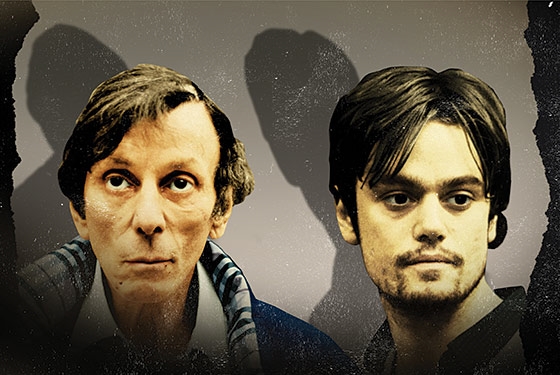 |
(Photo: Newscom (Joseph Brooks); Steven Hirsch/Splash News (Nicholas Brooks). Illustration by Gluekit) |
When they met one night last June, Nicholas Brooks and Sylvie Cachay should not, their friends say, have been attracted to each other. Sylvie was an ambitious designer, once divorced, who sought out serious relationships with similarly driven men. Nick had recently dropped out of college, had never held a job for more than a few months, and had dated many women.
“They had nothing in common,” a friend of Sylvie’s says.
“Sylvie wasn’t typical for him,” a friend of Nick’s says.
But they did fall for each other, and by July, they could be seen around Sylvie’s West Village home, walking her miniature poodle or eating at the Little Owl. Nick, 24, and Sylvie, 33, were regulars at Employees Only and Cafe Cluny. They both dressed well and shopped at Sucre.
In the fall, the relationship turned volatile, and they repeatedly broke up and reconciled. On the evening of December 8, while in Sylvie’s apartment, Nick gave her some medication, possibly Xanax, according to a report he would later give police. She became groggy. Either he or she knocked a candle onto her bed, singeing her hair and lighting a small fire. At 12:30 a.m., to escape the smell, they left, then checked into Soho House, where Sylvie was a member. She reportedly told the desk clerk that she was “really tired” and incoherently complained about Nick. The desk clerk then helped her into the elevator and to Room 20, on the fourth floor. After Nick finished checking them in, he met Sylvie in the room. A staffer reported hearing Sylvie yelling at Nick.
A few hours later, guests in the room below called the front desk to say that water was coming through the ceiling. Nick would later tell police that, in the interim, he’d left Sylvie, who wanted to take a bath, and went upstairs to eat in the lounge. There he met a man he didn’t know. Surveillance footage indicates that Nick last left the room sometime after 2:00 a.m. After that, he would tell police, he and the man went to Employees Only and then to the man’s house, where they did cocaine. Nick returned to Soho House at 5:30 a.m. on the morning of December 9 to find a cordoned-off crime scene. According to authorities, Nick’s account is accurate save for one detail: At some point during the night, they allege, he took Sylvie by the neck, forced her underwater, and strangled her.
Sylvie’s body, clad in underwear and a T-shirt, was found submerged faceup in Room 20’s overflowing bathtub around 3:00 a.m.
After Nick pleaded not guilty to second-degree murder at his January arraignment, Sylvie’s brother told reporters gathered outside the Manhattan Supreme Court building that “it was truly horrific and terrible to see this disgusting individual” who “has absolutely no respect for anyone at all, or the law, or life, or my sister, or my family.” Nick’s sister, however, called him “a wonderful young man,” and his freshman-year roommate at the University of Colorado told me he “always had a smile on his face” and “he’d always talk a lot about how much he loved his dad and sister.”
Which raises this case’s longest shadow: Nick’s father, who was not present at his son’s arraignment, possibly because he and Nicholas have a painful history. Or it might be because in 2009, the Manhattan district attorney indicted Joseph Brooks, a onetime composer and director and an Academy Award winner, for serial sexual assault.
Raised in New York, Joe, now 72, first made his name in the sixties as a composer of ad music. He wrote, among other jingles, Pepsi’s “You’ve Got a Lot to Live” and Maxwell House’s “Good to the Last Drop Feeling.” (His brother, Gilbert Kaplan, an amateur Mahler scholar, founded Institutional Investor magazine in his twenties.) By his thirties, Joe was very wealthy, but he hadn’t achieved the same level of fame that his music had. So he attempted to woo Hollywood with a series of makeshift and increasingly bizarre films.
He managed a single hit, 1977’s You Light Up My Life, which he wrote, directed, scored, and financed, but “he really didn’t know what the hell he was doing. He was an egomaniac,” recalls one of the film’s actors, Stephen Nathan. Nonetheless, Joe won an Oscar for Best Original Song for its title track (a Debby Boone version also topped the Billboard chart). Flush with success, Joe went on to co-write, direct, score, and produce his next film, the obscure flop If Ever I See You Again, about a rich ad-jingle writer with dreams of breaking into Hollywood. He insisted on starring in the movie, too, despite suffering from a severe stutter. As the Times’ Janet Maslin observed in her review of the film, Joe’s semi-autobiographical protagonist “is an ambitious egomaniac whose immodesty knows no bounds.”